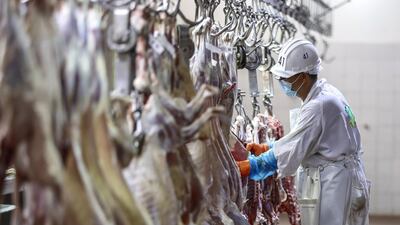The ordinarily bustling walkways near Abu Dhabi’s main livestock market were virtually deserted on Wednesday, two days before Eid Al Adha is celebrated throughout the Muslim world.
Each year, hundreds of thousands of goats and sheep are sacrificed at the Abu Dhabi Public Slaughterhouse so Muslims can feast with their families and donate a portion to the poor.
The religious tradition has been carried out each year for centuries, with processes becoming more organised over time.
Typically, thousands of customers would descend on the market to choose their livestock for sacrifice, but not this year.
Most of the activity at the abattoir at noon on Wednesday was from drivers who waited patiently to collect meat on behalf of their employers.
Trips to the market were replaced by online orders, as people maintained physical distancing by staying home.
Orders for about 50 sheep were made at the abbatoir through the Zabehaty mobile app, while only 10 were made at the drive-through window.
During Eid, Muslims are encouraged to donate meat to those in need.
This can be done through donations to Emirates Red Crescent, which slaughters and distributes meat on behalf of the donor.
“More people have chosen to slaughter their sacrifice through Red Crescent coupons or the Zabehaty app, with which we have a partnership,” said Khalfan Al Muhairbi, section head of Abu Dhabi Slaughterhouses.
Mr Al Muhairbi said this was driven by safety measures preventing customers from supervising their sacrifice.
“People now must bring the sheep [or sacrificed animal] in their car, drop it at a drop-off point and drive through to the pick-up point where they wait until their order is ready," he said. “No one steps down from their car.
To control traffic and process orders, customers must queue to drop off their livestock and clerics can pick up only one order at a time. Waiting time can be up to two hours.
“This is the first time we are doing it this way, because of Covid-19,” Mr Al Muhairbi said.
“Before, people came in together and watched their meat being processed and gave instructions to the butcher through the window.”
He said at first the drive-through method drew a few complaints.
“Some would say, ‘I need to watch it and speak God’s name on it when it is being slaughtered’,” Mr Al Muhairbi said.
But people have since grown to accept the new process and appreciate the safety measures.
“We have been advising people to go through the Zabehaty app or the Emirates Red Crescent," Mr Al Muhairbi said.
"I think people now understand that because of Covid-19 they don’t want to be going out and risk mixing with others.
"So even during Eid, you can just stay at home and order your slaughter and it will be delivered to you per your request."
The abattoir typically slaughters about 25,000 animals during Eid Al Adha and this holiday should be no different, he said.
Islamic slaughtering laws are applied at the abattoir to ensure the meat is halal.
Vets are on site to inspect the animals and ensure they are fit for consumption.
“We usually inspect them by sight. We do have a lab but it is only used in rare cases,” said Dr Ameer Saleh, a vet at the slaughterhouse.
“First we look at the colour of the meat. If it is too red it means it is not in a good condition. It could have suffered fever or a virus.
"If it is too yellow, it could mean that it had kidney problems or bacteria.”
Unhealthy animals are destroyed and the customer is compensated with a healthy goat or sheep.










